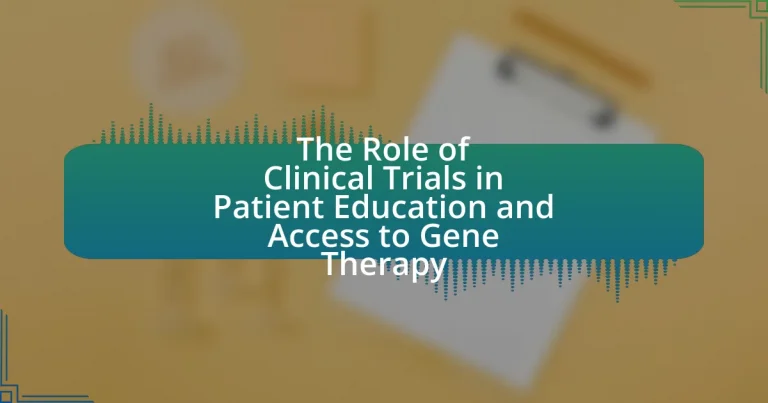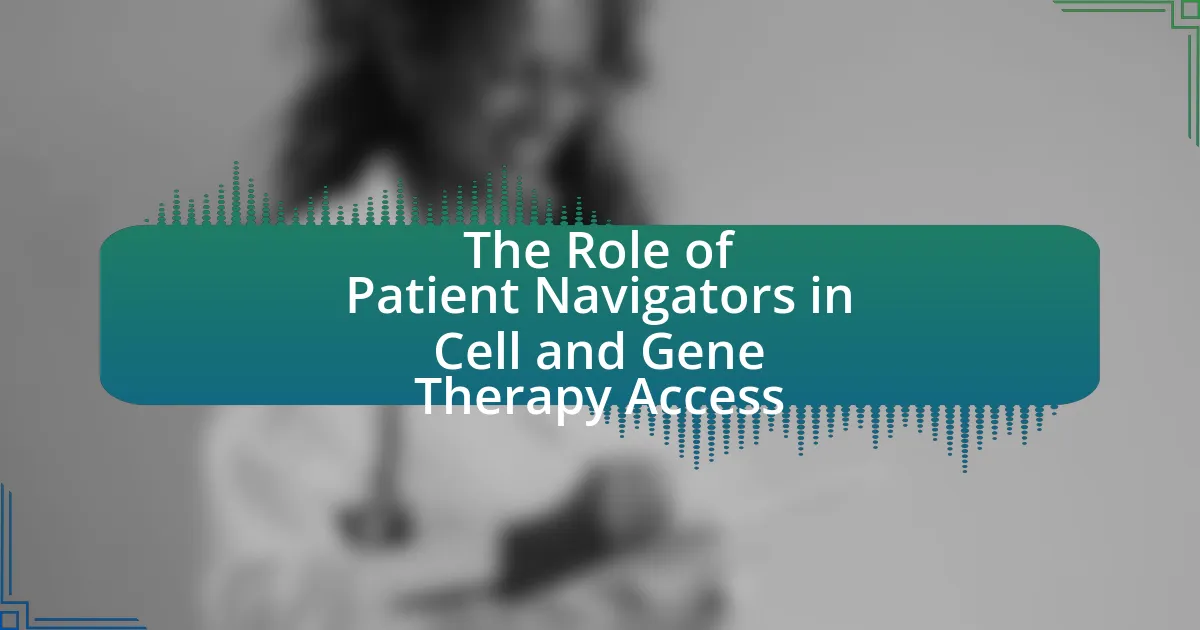Clinical trials are essential for enhancing patient education and access to gene therapy, providing structured environments for testing new treatments while disseminating vital information about their efficacy and safety. These trials educate patients on the benefits and risks of gene therapy, facilitating informed decision-making through detailed consent processes and ongoing monitoring. They also address barriers to access, such as high costs and limited availability, by offering cutting-edge therapies that may not yet be widely available. The article explores the various phases of clinical trials, their impact on patient understanding, and the ethical considerations involved, ultimately highlighting the significant role of regulatory agencies in shaping the future accessibility of gene therapies.
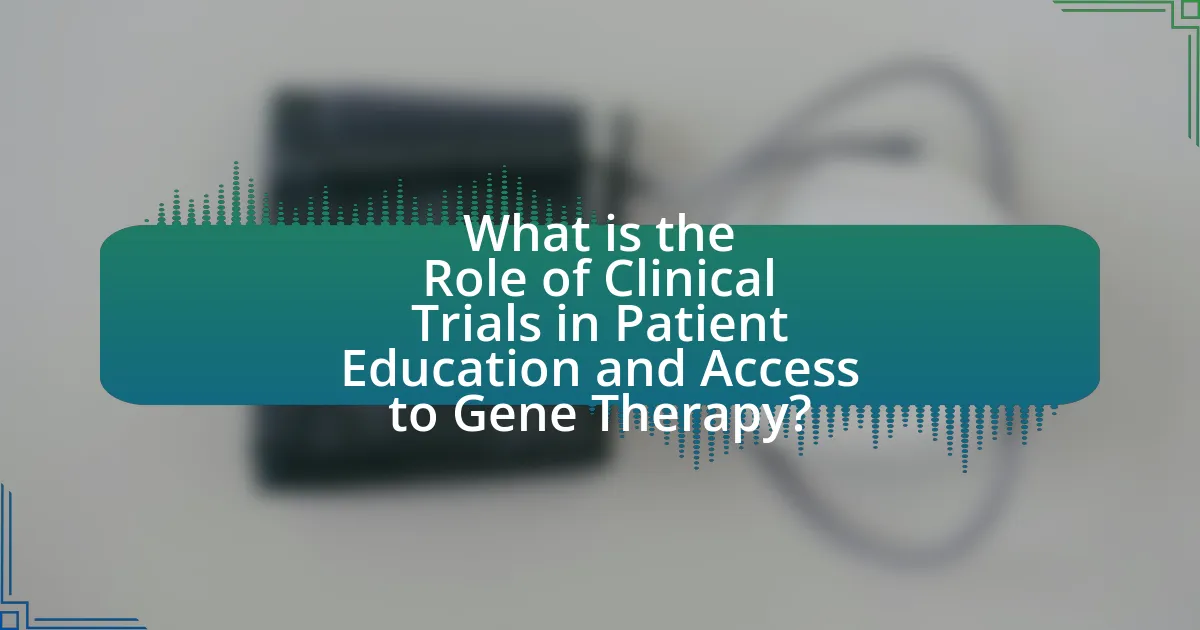
What is the Role of Clinical Trials in Patient Education and Access to Gene Therapy?
Clinical trials play a crucial role in patient education and access to gene therapy by providing structured environments for testing new treatments and disseminating information about their efficacy and safety. These trials educate patients about the potential benefits and risks of gene therapy, enabling informed decision-making. For instance, clinical trials often include detailed consent processes that inform participants about the therapy’s mechanisms, expected outcomes, and possible side effects. Additionally, they facilitate access to cutting-edge treatments that may not yet be available through standard care, as many gene therapies are initially offered only within trial settings. According to the National Institutes of Health, participation in clinical trials can also lead to improved patient outcomes, as these studies often provide patients with close monitoring and access to expert care.
How do clinical trials contribute to patient education regarding gene therapy?
Clinical trials contribute to patient education regarding gene therapy by providing structured information about treatment protocols, potential risks, and expected outcomes. These trials often include educational components that inform participants about the mechanisms of gene therapy, the specific genetic conditions being targeted, and the scientific rationale behind the treatment. For instance, clinical trials typically involve informed consent processes where patients receive detailed explanations about the therapy, enhancing their understanding and engagement. Additionally, data from clinical trials can be disseminated through publications and presentations, further educating the broader patient community about advancements in gene therapy and its implications for various genetic disorders.
What information do clinical trials provide to patients about gene therapy?
Clinical trials provide patients with critical information about gene therapy, including the therapy’s safety, efficacy, potential side effects, and eligibility criteria for participation. These trials are designed to assess how well gene therapies work in treating specific conditions, offering data on patient outcomes and the biological mechanisms involved. For instance, results from clinical trials can reveal the percentage of patients who experience significant improvement in their condition, as well as any adverse reactions reported during the study. This information is essential for patients to make informed decisions about their treatment options and to understand the risks and benefits associated with gene therapy.
How do clinical trials enhance patient understanding of treatment options?
Clinical trials enhance patient understanding of treatment options by providing structured information about new therapies and their potential benefits and risks. Through participation in clinical trials, patients receive detailed explanations of the treatment protocols, eligibility criteria, and expected outcomes, which fosters informed decision-making. Research indicates that patients involved in clinical trials report a greater understanding of their condition and available therapies, as they engage directly with healthcare professionals and receive educational materials tailored to their specific treatment context. This direct engagement not only clarifies the complexities of treatment options but also empowers patients to actively participate in their healthcare decisions.
Why is patient access to gene therapy important?
Patient access to gene therapy is important because it enables individuals with genetic disorders to receive potentially life-saving treatments that can address the root cause of their conditions. Access to these therapies can significantly improve health outcomes, as evidenced by clinical trials demonstrating that gene therapies can lead to long-term remission or even cures for diseases like spinal muscular atrophy and certain types of inherited blindness. Furthermore, equitable access to gene therapy ensures that all patients, regardless of socioeconomic status, have the opportunity to benefit from advancements in medical science, thereby reducing health disparities.
What barriers exist that limit patient access to gene therapy?
Barriers that limit patient access to gene therapy include high costs, limited availability of treatments, regulatory hurdles, and lack of awareness among patients and healthcare providers. High costs can exceed hundreds of thousands of dollars, making it financially prohibitive for many patients. Limited availability arises from the fact that not all gene therapies are widely distributed or approved in every region, restricting access to those in specific locations. Regulatory hurdles involve complex approval processes that can delay the introduction of new therapies to the market. Additionally, a lack of awareness among patients and healthcare providers about the potential benefits and availability of gene therapies can prevent individuals from seeking these innovative treatments.
How can clinical trials help overcome these barriers?
Clinical trials can help overcome barriers to patient education and access to gene therapy by providing structured environments for testing new treatments and disseminating information. These trials often include educational components that inform participants about the gene therapy process, potential benefits, and risks, thereby enhancing understanding and engagement. Furthermore, clinical trials can facilitate access to cutting-edge therapies that may not be available outside of the trial setting, addressing disparities in treatment availability. For example, a study published in the journal “Nature Reviews Drug Discovery” highlights that clinical trials can increase patient access to innovative therapies by recruiting diverse populations and ensuring equitable representation, which is crucial for generalizing findings to broader patient groups.
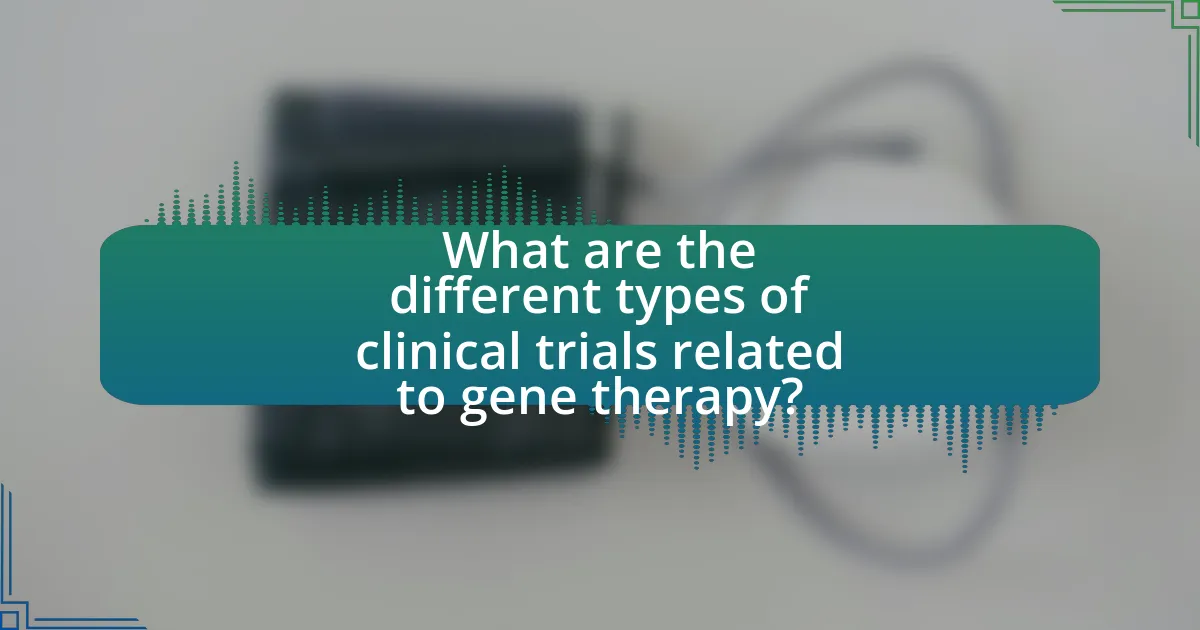
What are the different types of clinical trials related to gene therapy?
The different types of clinical trials related to gene therapy include Phase I, Phase II, Phase III, and Phase IV trials. Phase I trials primarily focus on assessing the safety and tolerability of gene therapy interventions in a small group of participants. Phase II trials evaluate the efficacy of the gene therapy in a larger cohort while continuing to monitor safety. Phase III trials involve even larger populations to confirm effectiveness, monitor side effects, and compare the new treatment to standard therapies. Finally, Phase IV trials occur after the therapy has been approved, focusing on long-term effects and further assessing the therapy in diverse populations. Each phase is crucial for ensuring that gene therapies are both safe and effective before they become widely available.
How do Phase I, II, and III trials differ in their approach to gene therapy?
Phase I, II, and III trials differ in their approach to gene therapy primarily in their objectives, participant numbers, and evaluation methods. Phase I trials focus on assessing the safety and tolerability of gene therapy in a small group of participants, typically involving fewer than 30 individuals, to determine the appropriate dosage and identify side effects. Phase II trials expand the participant pool to several dozen to a few hundred individuals, aiming to evaluate the efficacy of the gene therapy while continuing to monitor safety. Phase III trials involve large populations, often thousands of participants, to confirm the therapy’s effectiveness, monitor side effects, and compare it to standard treatments, providing comprehensive data for regulatory approval. Each phase builds on the findings of the previous one, ensuring a thorough evaluation of the gene therapy’s safety and efficacy before it reaches the market.
What are the objectives of Phase I clinical trials in gene therapy?
The objectives of Phase I clinical trials in gene therapy primarily focus on assessing the safety and tolerability of the gene therapy intervention in human subjects. These trials aim to determine the maximum tolerated dose and identify any potential side effects associated with the treatment. According to the FDA, Phase I trials are crucial for establishing a preliminary understanding of how the gene therapy interacts with the human body, which is essential for ensuring patient safety in subsequent phases of clinical testing.
How do Phase II trials assess the efficacy of gene therapy?
Phase II trials assess the efficacy of gene therapy by evaluating the treatment’s effectiveness in a larger group of participants after initial safety has been established in Phase I. These trials typically involve a controlled environment where specific endpoints, such as improvement in disease symptoms or biomarkers, are measured against a placebo or standard treatment. For instance, in a Phase II trial for a gene therapy targeting a genetic disorder, researchers might track changes in clinical outcomes, such as reduced disease progression or enhanced quality of life, over a defined period. The results from these trials provide critical data on the therapy’s potential benefits and help determine whether it should proceed to Phase III trials, which involve even larger populations and further confirm efficacy and safety.
What role do Phase III trials play in the approval of gene therapies?
Phase III trials are crucial in the approval of gene therapies as they provide comprehensive evidence of the therapy’s efficacy and safety in a larger patient population. These trials typically involve hundreds to thousands of participants and are designed to confirm the findings from earlier phases, assess the overall benefit-risk ratio, and establish the therapy’s effectiveness compared to standard treatments or placebos. Regulatory agencies, such as the FDA, require positive results from Phase III trials to grant approval for commercial use, ensuring that the gene therapy meets rigorous safety and efficacy standards before it becomes available to patients.
What ethical considerations are involved in clinical trials for gene therapy?
Ethical considerations in clinical trials for gene therapy include informed consent, risk-benefit analysis, and equitable access. Informed consent ensures that participants understand the potential risks and benefits of the therapy, which is crucial given the experimental nature of gene therapy. Risk-benefit analysis involves evaluating whether the potential benefits to participants outweigh the risks involved, particularly since gene therapy can have unforeseen consequences. Equitable access addresses the need to ensure that diverse populations can participate in trials, preventing disparities in who benefits from advancements in gene therapy. These considerations are essential to uphold ethical standards and protect participants’ rights and welfare in clinical research.
How is informed consent obtained from participants in gene therapy trials?
Informed consent from participants in gene therapy trials is obtained through a structured process that ensures participants understand the trial’s purpose, procedures, risks, and benefits. This process typically involves providing detailed information through written documents and verbal explanations, allowing participants to ask questions and receive clarifications. The consent process is designed to ensure that participants voluntarily agree to participate, fully informed of their rights and the implications of their involvement. Regulatory guidelines, such as those from the FDA and EMA, mandate that informed consent must be documented and that participants can withdraw at any time without penalty, reinforcing the ethical standards in clinical research.
What measures are taken to ensure patient safety during clinical trials?
Measures taken to ensure patient safety during clinical trials include rigorous ethical oversight, informed consent processes, and continuous monitoring of participants. Ethical oversight is provided by Institutional Review Boards (IRBs), which review trial protocols to ensure that risks are minimized and that the rights of participants are protected. Informed consent requires that participants are fully educated about the trial’s purpose, procedures, risks, and benefits before agreeing to participate. Continuous monitoring involves regular assessments of participant health and safety, often through Data Safety Monitoring Boards (DSMBs), which can recommend modifications or termination of the trial if safety concerns arise. These measures are essential to uphold the integrity of clinical research and protect participants throughout the trial process.
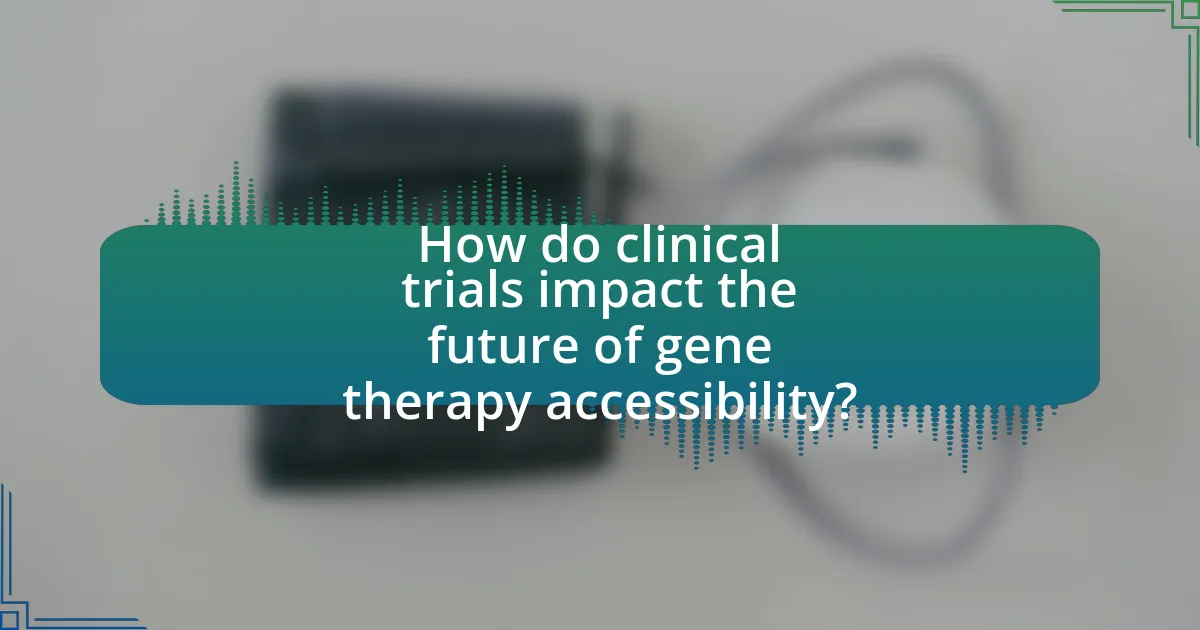
How do clinical trials impact the future of gene therapy accessibility?
Clinical trials significantly influence the future accessibility of gene therapy by establishing safety, efficacy, and regulatory approval pathways. These trials provide critical data that informs healthcare providers and policymakers, ultimately shaping treatment guidelines and insurance coverage. For instance, successful clinical trials can lead to the approval of gene therapies by regulatory bodies like the FDA, which in turn increases patient access through wider availability in healthcare systems. Additionally, the results from these trials often drive public and private funding, enhancing research and development efforts, which further expands access to innovative therapies.
What role do regulatory agencies play in facilitating access to gene therapy through clinical trials?
Regulatory agencies play a crucial role in facilitating access to gene therapy through clinical trials by establishing guidelines that ensure safety, efficacy, and ethical standards. These agencies, such as the U.S. Food and Drug Administration (FDA) and the European Medicines Agency (EMA), review and approve clinical trial protocols, which helps streamline the process for researchers and sponsors. By providing a structured framework, these agencies enable faster patient access to innovative therapies while maintaining rigorous oversight. For instance, the FDA’s Breakthrough Therapy designation expedites the development and review of therapies that treat serious conditions, allowing patients to participate in trials sooner. This regulatory support is essential for advancing gene therapy research and improving patient outcomes.
How do clinical trial results influence policy decisions regarding gene therapy?
Clinical trial results significantly influence policy decisions regarding gene therapy by providing evidence of safety and efficacy. Regulatory agencies, such as the FDA, rely on data from clinical trials to assess whether a gene therapy product should be approved for public use. For instance, the approval of Zolgensma, a gene therapy for spinal muscular atrophy, was based on clinical trial results demonstrating its effectiveness in improving motor function in patients. These results inform guidelines and regulations that govern the use of gene therapies, ensuring that only those with proven benefits are made available to patients. Additionally, positive trial outcomes can lead to increased funding and support for gene therapy research, further shaping policy in this area.
What strategies can patients use to engage with clinical trials for gene therapy?
Patients can engage with clinical trials for gene therapy by actively researching available trials, consulting healthcare providers, and utilizing online registries. Researching trials involves accessing databases like ClinicalTrials.gov, which lists ongoing studies, eligibility criteria, and locations. Consulting healthcare providers allows patients to receive personalized advice and recommendations based on their medical history and condition. Online registries, such as the Gene Therapy Clinical Trials Registry, provide comprehensive information on gene therapy trials, helping patients identify suitable options. These strategies empower patients to make informed decisions and increase their chances of participating in relevant clinical trials.
How can patients find relevant clinical trials for their conditions?
Patients can find relevant clinical trials for their conditions by utilizing online databases such as ClinicalTrials.gov, which lists trials by condition, location, and phase. This platform is maintained by the U.S. National Library of Medicine and provides comprehensive information on ongoing and completed trials, including eligibility criteria and contact details for trial sites. Additionally, patients can consult their healthcare providers, who may have access to information about trials that are not widely advertised and can offer personalized recommendations based on the patient’s specific medical history and condition.
What questions should patients ask before participating in a clinical trial?
Patients should ask several key questions before participating in a clinical trial, including: What is the purpose of the trial? Understanding the trial’s objective helps patients gauge its relevance to their condition. What are the potential risks and benefits? This information is crucial for informed consent and assessing personal health implications. What are the eligibility criteria? Knowing this helps patients determine if they qualify for the trial. What will be required of me during the trial? This includes understanding the time commitment and any procedures involved. How will my health be monitored? Patients should know how their safety will be ensured throughout the trial. Finally, what happens after the trial? This question addresses follow-up care and access to treatment post-trial. These inquiries are essential for making an informed decision about participation in clinical trials, which play a significant role in advancing gene therapy and patient education.
